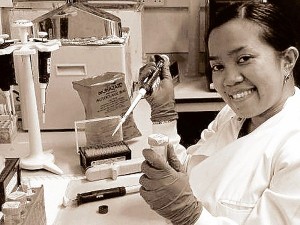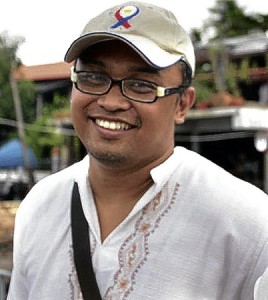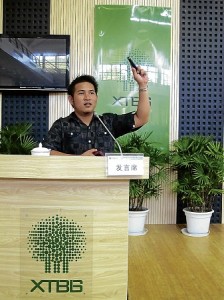Scholars for service
While many graduating college students aspire to earn master’s and doctorate degrees, the cost of additional years of schooling makes them abandon their dream or put it on hold and brace themselves for job hunting and interviews.
Fortunately for three students, they see graduate studies as not just more academic achievements, but also an opportunity to make more significant contributions to the Philippines and humanity. The scholarships have put their goals within reach.
Nery Ronatay, 35, is a recipient of the Nippon Foundation for Asian Peacebuilders Scholarship for academic year 2012-2013. He is pursuing a Master of Arts degree in Gender and Peace Building at the University of Peace in Costa Rica.
The Albay native was a former humanitarian worker in Malawi. As a United Nations Volunteer in Bangkok, Thailand, he was involved in the HIV-AIDS program.
“I did not plan to study in China,” says Bonifacio “Bon” Pasion, 25, from Tarlac, “but I was asked to apply for the scholarship.”
Article continues after this advertisementPasion was attending a field course in 2011 at Xishuangbanna Tropical Botanical Garden in the Chinese Academy of Sciences.
Article continues after this advertisementOne of the professors at the academy noticed the intelligence and keen interest in ecology of the research associate from the Institute of Biology at the University of the Philippines (UP) in Diliman, Quezon City.
The professor convinced Pasion to take the scholarship examination and undergo the interview.
In 2012, he received a three-year scholarship at the Graduate University of the Chinese Academy of Sciences to pursue a Master of Science in Ecology and Conservation Biology degree.
Mary Grace Dacuma, a B’laan of Kitagas, Sarangani Province and assistant professor at the UP Los Baños, is on study leave, as she pursues a Doctor of Philosophy in Infectious and Tropical Diseases degree at the London School of Hygiene and Tropical Medicine, University of London (LSHTM).
Initially, her studies were supported by the Ford Foundation International Fellowships Program (IFP) but because the program was nearing its end in the Philippines, three-year grants were no longer given.
Multicultural
The UP System Faculty Development Program Doctoral Studies Fund gave her a scholarship grant so she could complete her post-graduate studies. Dacuma is expected to get her degree in 2014.
The atmosphere is generally laid-back at the University of Peace, according to Ronatay. Although its 190 students, taking specialized courses on various aspects of peace, represent 50 different nationalities, there is no cut-throat competition seen in bigger universities.
Pasion finds lots of fun and excitement in being a student in another country. “I was able to travel and meet new people of different nationalities and learn their cultures, develop greater confidence and discover new perspectives… my life here as a student is easier than when I was in college because here they provide everything I need. The only downside is… being away from family and friends, which is very difficult to overcome,” he says.
While the territorial dispute between the Philippines and China does not cause any problem, he finds if more difficult to deal with the cultural and language barrier.
Dacuma says, “Being at the LSHTM is a breathtaking journey to a highly modernized research institution. The school is open to research students 24/7. We [have] world-class facilities and services, and experts are on hand to discuss our research findings.”
Explaining his field of study, Ronatay says, “Peace is abstract, just like development, that is why we need experts who understand and can implement this.” His area, which focuses on Gender and Peace Building, studies “the roles of women, children and men in the peace process, as well as gender issues…”
For his internship in October, Ronatay chose Myanmar because of its unique setting and geopolitical relevance, as well as its peace process after the release of Nobel Peace laureate Aung San Suu Kyi.
Helping Filipinos
Pasion points out that the Philippines is one of the most bio-diverse regions in the world. But that diversity is seriously threatened by massive deforestation and habitat destruction.
His field of study focuses on tropical forest conservation, specifically the restoration of tropical forest plants.
“The Philippines has set a national goal of eliminating malaria by 2020,” Dacuma says. “My study… will provide epidemiological data about malaria in Sarangani, South Cotabato and Tawi-Tawi. I study malaria parasites to know what species continue to circulate in the human population despite existing control and elimination measures. My research findings will (help channel) control and elimination measures where (most) needed.”
Her study is expected to benefit not just the Philippines but other countries still battling malaria.
Ronatay may not return to the Philippines after his study, as a development worker has to go where there is a need and wherever an opportunity presents itself.
Ronatay says Filipino development workers have the flexibility to adapt quite easily to the customs of wherever they are sent to. Their command of English is also better than that of some nationalities. “We are a mine of skills,” he says.
Pasion will come home and teach forest plant ecology or do research work related to forest conservation. He will pursue a PhD in Plant Taxonomy and become a botanist like his mentor Leonard Co, who was killed while on a field trip to inventory local flora, and to discover new plants.
Dacuma will resume her teaching at UPLB and do more research on malaria control and elimination in the Philippines.


